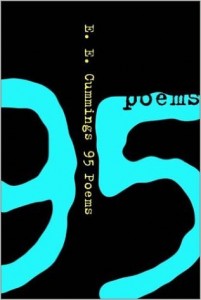 There is a playful strangeness central to the appeal of E.E. Cummings, one that has sustained his reputation over the last half-century, even as other, greater poets have become less widely read. But this same playfulness belies his formal difficulties and often dark subject matter, and it has always seemed strange to me that his reputation as a poet was so at odds with much of his verse. 95 Poems dispenses with much of what is dark, difficult and lascivious in Cummings’ work; it was the last collection of new poems published in his lifetime, and a fitting capstone to a prolific career.
There is a playful strangeness central to the appeal of E.E. Cummings, one that has sustained his reputation over the last half-century, even as other, greater poets have become less widely read. But this same playfulness belies his formal difficulties and often dark subject matter, and it has always seemed strange to me that his reputation as a poet was so at odds with much of his verse. 95 Poems dispenses with much of what is dark, difficult and lascivious in Cummings’ work; it was the last collection of new poems published in his lifetime, and a fitting capstone to a prolific career.
The collection’s opening poem (none of these poems are titled; they are merely numbered 1-95) gives a fitting introduction to how he will manipulate form and line structure:
l(a
le
af
fall
s)
one
liness
Re-arranged, the poem reads: L(a leaf falls)oneliness, but its form – calling to mind the vertical descent of the leaf, and creating symmetries in the words themselves (af/fa) that suggest connection – gives it meaning. Cummings uses brackets much the way David Foster Wallace uses footnotes, breaking up his writing with a tangent or teasing aside. Here is #11, taking this technique a step further:
in time’s a noble mercy of proportion
with generosities beyond believing
(though flesh and blood accuse him of coercion
or mind and soul convict him of deceiving)whose ways are neither reasoned nor unreasoned
his wisdom cancels conflict and agreement
– saharas have their centuries; ten thousand
of which are smaller than a rose’s momentthere’s time for laughing and there’s time for crying –
for hoping for despair for peace for longing
– a time for growing and a time for dying:
a night for silence and a day for singingbut more than all (as all your more than eyes
tell me) there is a time for timelessness
Time has replaced God in a devotional poem, with overt allusions to Ecclesiastes; it is Time whose merciful proportions can “cancel conflict and agreement,” and whose ways are inscrutable to man, “neither reasoned nor unreasoned.” What does it mean to say that ten thousand centuries of the Sahara are “smaller than a rose’s moment”? Presumably the rose’s moment is its blossoming, and this,though fleeting, Cummings asserts, surpasses in value all that the empty desert can conjure. The final, two-line stanza picks up on this theme, mentioning, for the first time, a third person (“your more than eyes”), who represents, to the poetic speaker, a moment of timelessness. This is the turn, the payoff, the moment that what he established in the previous lines can be harnessed to his purpose, when the devotional subject of the poem slips, almost imperceptibly, from Time to a beloved person.
The playfulness I cited earlier is perhaps best on display in poem #16:
in time of daffodils (who know
the goal of living is to grow)
forgetting why, remember howin time of lilacs who proclaim
the aim of waking is to dream,
remember so (forgetting seem)in time of roses (who amaze
our now and here with paradise)
forgetting if, remember yesin time of all sweet things beyond
whatever mind may comprehend,
remember seek (forgetting find)and in a mystery to be
(when time from time shall set us free)
forgetting me, remember me
In tone and theme, this is strikingly similar to Mary Oliver‘s poem “Roses,” enjoining us to live as flowers do, in the care-free now rather than the uncertain future or immutable past. For my part, I like his love poems best, where his strangeness injects new life into stale forms:
i love you much (most beautiful darling)
more than anyone on the earth and i
like you better than everything in the sky– sunlight and singing welcome your coming
although winter may be everywhere
with such a silence and such a darkness
noone can quite begin to guess(except my life) the true time of year –
and if what calls itself a world should have
the luck to hear such singing (or glimpse such
sunlight as will leap higher than high
through gayer than gayest someone’s heart at your eachnearerness) everyone certainly would (my
most beautiful darling) believe in nothing but love
and
being to timelessness as it’s to time,
love did no more begin than love will end;
where nothing is to breathe to stroll to swim
love is the air the ocean and the land(do lovers suffer? all divinities
proudly descending put on deathful flesh:
are lovers glad? only their smallest joy’s
a universe emerging from a wish)love is the voice under all silences,
the hope which has no opposite in fear;
the strength so strong mere force is feebleness:
the truth more first than sun more than star– do lovers love? why then to heaven with hell.
Whatever sages say and fools, all’s well.
Take “if what calls itself a world” together with “a universe emerging from a wish” and you see, in the two poems, a remarkable consistency of vision. Lovers have time only for each other, they create whole worlds from the smallest joys, and the outside world – “what calls itself a world” – should be so lucky to share in their pleasures.